2023 Environmental Justice Symposium
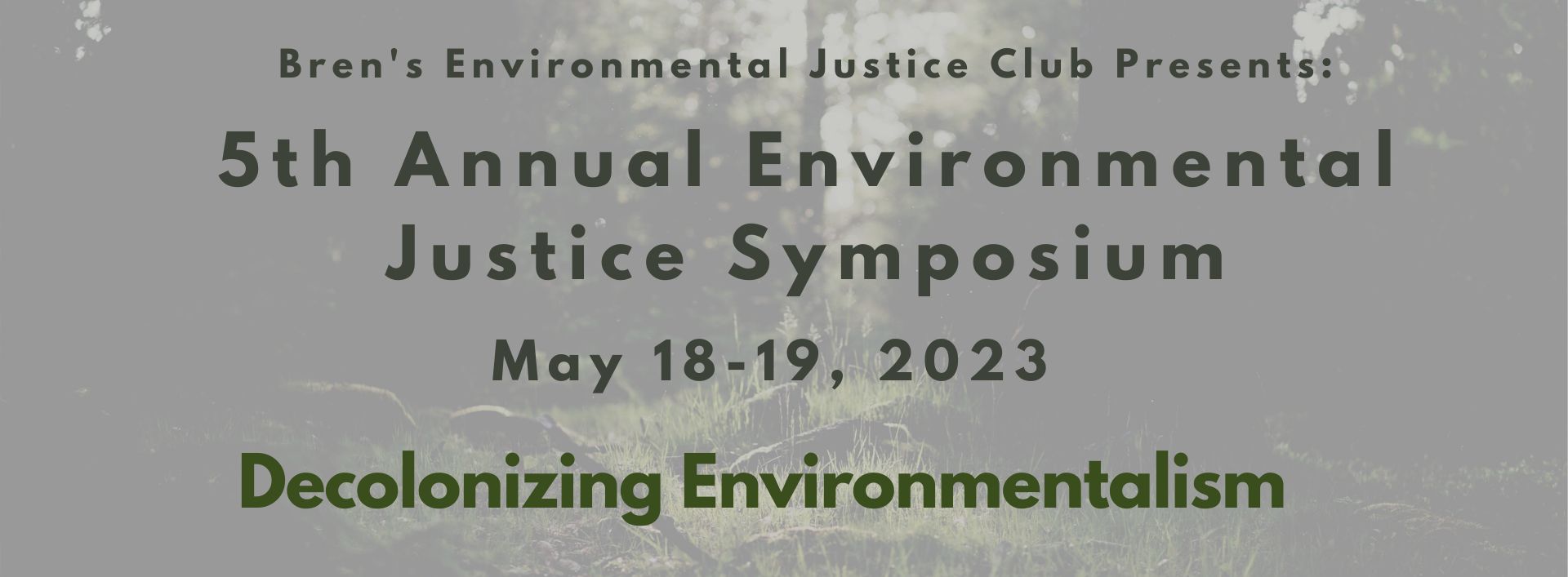
The 5th Annual Environmental Justice Symposium, presented by the Bren School Environmental Justice Club, is a hybrid event that will explore topics ranging from the roots of environmental harm to advice for environmental justice careers. This event brings together interdisciplinary scholars, activists, and thought leaders to envision the future of environmental justice. The symposium will be held Thursday, May 18 (online streaming sessions) and Friday, May 19 (in Bren Hall 1414 with online viewing available).
No registration is required to attend either session. All times listed are in Pacific Time.
Event Co-Sponsors: Bren School of Environmental Science & Management, UCSB Graduate Students for Diversity in Science, UCSB Graduate Student Association, UCSB Environmental Affairs Board
Descarga el anuncio en español
SCHEDULE
Thursday, May 18
4:00pm: Flash Talks
Online. Watch a recording of the flash talks here
3-4 minute presentations ranging from academic to community oriented environmental justice topics
5:00pm: Environmental Justice Career Panel
Online. Watch a recording of the panel here
This panel will explore the options Bren Students have to work in the environmental science field with a decolonization mindset. Panelists: Karla Garibay Garcia, Senior Conservation Manager, Azul; Sofi Magallon, Central Coast Alliance United for a Sustainable Economy; Marisa Villarreal, GRID Alternatives; and Teena Pugliese, Filmmaker. Moderated by Cristina Mancilla, Bren School.
Friday, May 19
2:00pm: Keynote Speaker – Mia Lopez
Bren Hall 1414. Watch a recording of the keynote here
Former Tribal Chair, Former Vice Chair, member and Tribal Representative of the Coastal Band of the Chumash Nation, one of several bands of Chumash people. She is also the Former Administrative Assistant at Wishtoyo Chumash Foundation, a Native Lead Non-profit that advocates, litigates and educates on behalf of the local Indigenous people, their territories, and natural cultural resources.
3:00pm: Decolonizing Environmentalism Panel
Bren Hall 1414. Watch a recording of the panel here
This panel will discuss the question of how environmentalists define and think about decolonization within the environmental space. Panelists include: Dena Montague, ÉnergieRich; McKalee Steen, PhD Candidate, UC Berkeley; Sarah Koyo. Moderated by Cameran Bahnsen, UCSB Environmental Studies.
4:00pm: Reception
Bren Hall Michael J. Connell Courtyard
About the Speakers
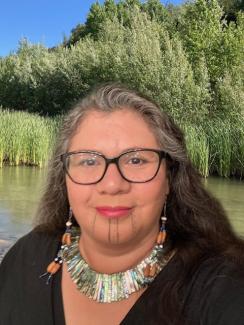
Keynote Speaker: Mia Lopez
Mrs. MariaElena or “Mia” Lopez, wears many hats in our community. She is a member, tribal representative and cultural Educator of the Coastal Band of the Chumash Nation, the largest group of several bands of Chumash in Santa Barbara County, as well as a former Tribal Chairwoman and past Vice Chair.
Mrs. Lopez has served her community with environmental issues that affect the lands, waters, and coastal areas; has acted as a liaison for the Tribe and the City of Santa Barbara, the City of Goleta, the County of Santa Barbara, the County of Ventura, NOAA and many other State and Federal Organizations. She maintains relationships with many departments at UC Santa Barbara, Santa Barbara City College, the Santa Barbara School District, County Parks, the National Parks Service and many local businesses and schools.
She has lectured on contemporary and historical Chumash life and culture, in K-12 classrooms, for many groups and organizations, and at the Wishtoyo Chumash Village in Malibu. Bringing people together, from Kinder to Graduate Students and professionals, to acknowledge the land and Original People throughout Chumash territory. As a certified naturalist, it has been her role to educate the community about Chumash relationships with their lands, plants, animals, and their maritime traditions. She is also a member of the Chumash Maritime Association, helping to maintain Chumash maritime traditions and educating through community events with the Tomol (traditional redwood plank canoe).
Maintaining these connections with her villages and non-human relatives is very important to her and being able to share the special details with small groups coming through Chumash lands, by heading nature walks with organizations in her areas, and speaking at other local events, gives her the opportunity not only to share a little about native plant history, but also to talk about the many village sites, that our cities are built upon.
Her goal is to help her community heal themselves as well as the land. By being a part of all these things, she can assure to make room for her communities, cultural, and spiritual wellness. Mrs. Lopez is also the Board Chairwoman of the local American Indian Health & Services clinic, which completes the circle of care for her community by providing physical and mental wellness.
Career Panel
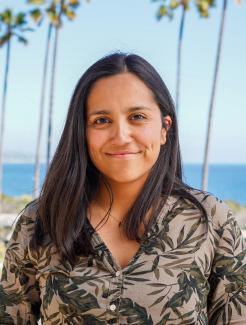
Karla Garibay Garcia is Senior Conservation Manager at Azul. Karla leads Azul's marine conservation and environmental justice policy and science efforts at the federal and California levels. Prior to joining Azul, Karla consulted for and lobbied in Sacramento on behalf of conservation, outdoor access, and climate-focused nonprofits. Karla also worked on Environmental Defense Fund's global climate team, where she focused on Latin America and California climate, air quality, and tropical deforestation policy efforts and partnerships with Indigenous Peoples. Karla earned a master's degree from the Bren School of Environmental Science & Management at UCSB with a focus on Coastal Resources Management and Strategic Environmental Communications.
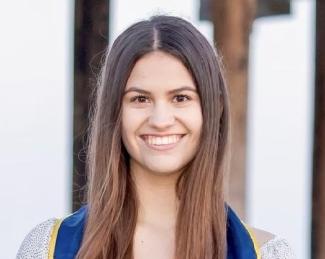
Sofi Magallon received a Bachelor of Science from the University of California, Berkeley, specializing in Environmental Economics and Policy. Upon graduating in 2021, Sofi joined Central Coast Alliance United for a Sustainable Economy (CAUSE), a non-profit, base-building organization committed to social, economic, and environmental justice for working class immigrant communities in the Central Coast. As CAUSE’s Environmental Justice Policy Advocate based in Ventura County, Sofi works to protect the communities most affected by pollution, climate change, and toxic pesticides. She has worked closely with the community of Oxnard to fight for clean air through pushing statewide zero-emissions policy, restoring areas of contamination for public greenspace access such as Ormond Beach and Wetlands, along with advocating for no more fossil fuels on a statewide level with Regenerate California. She is a Mexican-American who was born in Ventura, CA and grew up in Oxnard, CA. In her freetime, Sofi enjoys being in nature, reading, and playing chess.
Teena Pugliese is a filmmaker and digital activist currently focused on stewardship and deep community with people, place, and planets. Her work spans from documentary features & short form satires to improvised narrative films; with a focus on human rights & environmental justice, civic engagement through storytelling, and democratizing filmmaking opportunities. She loves her work supporting connections with youth and elders through storytelling, the arts and performance as pathways for healing & connection. She is a youth media trainer, teaching a regenerative filmmaking process so others may tell their stories and reclaim control of their own narratives. She is committed to and grateful for collaborations with all beings who work towards restoring our relations with each other and nature. Recently partnered with the Owens Valley Indian Water Commission in Payahuunadü to help return 5 acres of land back to the original stewards of the land and formed the Three Creeks Collective.
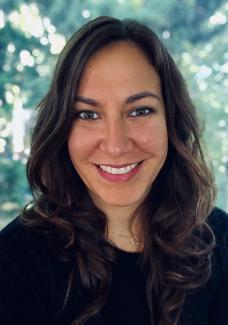
Marisa Villarreal sees herself as a connector - she likes connecting people to causes, ideas, and one another, with the goal of creating a healthier planet and more equitable societies. With a career background in nonprofits focusing on social impact, environmental justice, and climate change, Marisa is currently a Program Director at the renewable energy nonprofit GRID Alternatives. As the Director of the Solar on Multifamily Affordable Housing (SOMAH), Marisa leads a team of staff, in partnership with nonprofit and community-based organizations, to make renewable energy technology and jobs more accessible to California’s underserved and environmental justice communities, while furthering GRID's mission around equity and environmental justice. Prior to GRID, Marisa managed impact initiatives focusing on the UN Sustainable Development Goals, as a contractor with Google Cloud, and worked as a Program Manager for the Resilient by Design Bay Area Challenge -- a multidisciplinary design challenge to strengthen resilience to climate change in the Bay Area. She holds a Master's Degree from the Bren School of Environmental Science & Management, and a Bachelor's Degree from Wellesley College in Biological Sciences. In her free time Marisa loves to surf, learn recipes from her culture and family, and plan adventures with friends.
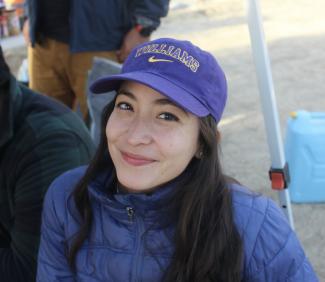
Cristina Mancilla (she/her) is a Master’s Student at the Bren School for Environmental Science & Management where she is studying Conservation Planning and Strategic Environmental Communications. She is from the Rio Grande Valley of South Texas where she grew up witnessing social and environmental injustice at the Mexico-US border. Cristina has worked in education access and mentorship of first-generation college students and is also passionate about inclusion and equity in the environmental sector. She believes that we should expand the definition of sustainability to include community well-being and is currently involved in a small-scale fisheries project in Baja California Sur to co-create a framework that centers justice in fishery transitions. Her goal is to develop conservation plans that embrace social justice, multinational collaboration, and community-empowerment.
Decolonizing Environmentalism Panel
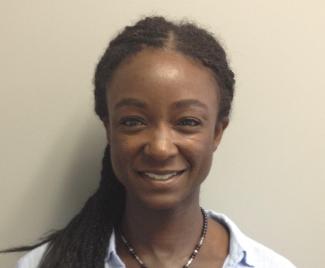
Dena Montague is a Lecturer at the Bren School of Environmental Science & Management at the University of California, Santa Barbara. She is the Founder and Executive Director of ÉnergieRich, an international social enterprise establishing local manufacturing of clean energy technology in West Africa. Her research focuses on energy justice through decentralized production; impacts of Global North clean energy transition on climate/environmental justice in the Global South; and environmental data justice. Dena earned a PhD in Political Science from UCLA and a BA from Brown University.
McKalee Steen comes from a long line of Cherokee storytellers and protectors of the environment. Raised on a rural farm in Oklahoma to a family of educators, the importance of education and environmental justice was ingrained in her. She is a third year PhD candidate at UC Berkeley studying Environmental Science, Policy and Management. She is passionate about studying Indigenous land stewardship practices, providing resources for Indigenous youth, and the power of storytelling. Her current research interests include exploring the social and ecological impacts of Indigenous land management in cases where Tribes have been able to reacquire land within their traditional territories.
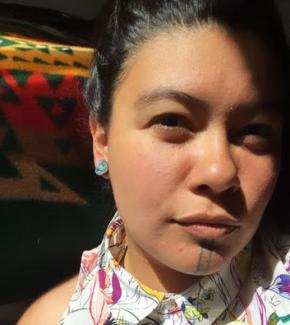
Sarah Koyo (they/them): Haku Haku Sala Koyo kakti kapapʰaniš hu moloq hi mikiw k’e swaxīl hil naxalamuw hi Limuw. They are also Tohono O’odham, Acoma, Irish and Spanish. They grew up in Tongva lands closest to the village of Chowingna on the coast. They grew up learning Chumash ways because that is the land closest to their family, geographically, they had connection to the community, and (most importantly) because their language was asleep and their dad wanted them to be a part of waking it up. They are still very involved in the native community in Syuxtun (so-called Santa Barbara), spending lots of time on Chumash lands there. They are involved in a plant mentorship program with some other Chumash folks, learning about their traditional medicines and becoming more intimately familiar with their maritime culture as well. One day, they know they’ll have landback for their community, where they could live with the land, in reciprocity, creating a space for sustainable living and loving, as an example for all generations to come.
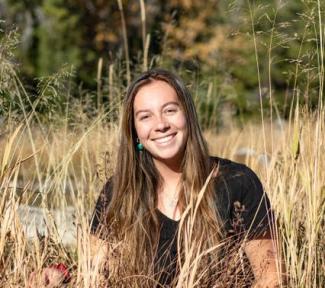
Cameran Bahnsen is a graduating senior at UCSB, majoring in Environmental Studies (B.S) with a minor in American Indian and Indigenous Studies. She is Assiniboine (Fort Peck, Montana) with mixed-European descent, and is Co-chair for the American Indian and Indigenous Student Association (AIISA) and a peer mentor for the American Indian and Indigenous Cultural Resource Center (AIICRC). Her interests primarily lie in Traditional Ecological Knowledge (TEK), Indigenous activism, plant science, and land rights.